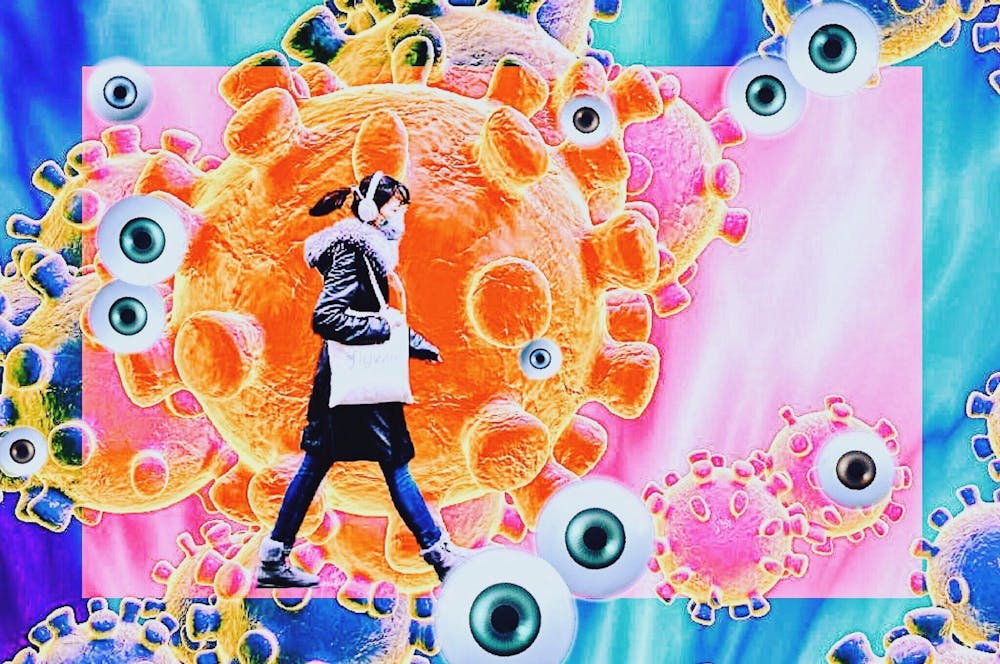
While waiting in line for the SEPTA, a man behind me makes a remark about me being a “diseased Chinese". A few days later, in line to check out groceries with my family, I look around and witness stares. Next to us, a man shares hand sanitizer with his wife and gives us a dirty look.
“Don’t fight back. Don’t cause a scene. Protect yourself first,” my dad always tells me. This is normal, I tell myself. People are scared, and they naturally associate “a virus from China” with me and my family’s faces. I look away and pretend I don’t see or hear what is clearly directed towards me.
At a time where factual and timely reporting is essential, I was reluctant to write a piece about racism — a phenomenon that has existed for centuries and is far less novel than the coronavirus. While the hostility towards me and my family made this issue personal, the attacks on the greater Asian community made writing about this necessary.
In the wake of COVID-19, I have seen attacks on Asians and Asian Americans throughout the world. In San Francisco, an elderly Asian man was hit and robbed when collecting cans for his family. In London, an Asian student was brutally attacked by four men. In New York, an Asian man standing on the subway was sprayed with Febreze. And in Philadelphia, an Asian couple was attacked, hit, and stomped on while waiting for the SEPTA.
While the general public is taking measures to protect themselves from a pandemic, Asian individuals must also protect themselves from hostility. I have long grown a thick skin to remarks such as “go back to China!” and senseless comments about my eye shape and the dimensions of my face. This new surge of violent racism brings to light a deeper issue we face regarding the Asian body in America.
These attacks on Asian Americans further the divisions between minorities in America during a time of crisis. Asians have long been thought of as the “model minority”; in other words, a myth that Asians are more successful because they are naturally studious and high achievers. This myth paints Asians as the shining example of achieving the “American Dream”, hence a model other minorities in America should follow.
This “model minority” myth has often been used as a racial wedge between Asians and other minorities, and is rooted in the idea of Anti-Blackness. Since the 1960s civil rights movement, the divisions between Asian and Black Americans have been held up by the conservative white majority. The root of this argument is that Black failure and Asian success cannot be explained by racism, and that they are one and the same.
It’s equally important to note that (1) Asian Americans have not faced the same systematic and structural oppression as Black Americans and (2) we should not turn a blind eye to xenophobia due to the “model minority” myth.
Hatred-fueled actions in response to disease outbreaks are not new to history. Jews were blamed for the bubonic plague in the 1300s, Irish immigrants accused of spreading typhoid in the 1800s, Mexican Americans for swine flu in 2009, and West Africans for Ebola in 2014. The outbreak of COVID-19 has proven to be no different.
In the current climate of anxiety and widespread use of media, misinformation spreads as quickly as the virus itself. The World Health Organization has stated that fake claims regarding COVID-19 have sparked a type of “infodemic,” often leading to anti-Asian sentiments. It’s clear that these sentiments have existed much earlier than the virus itself and coronavirus is not an excuse to further perpetuate racist beliefs.
So please take the necessary measures to protect yourself — wash your hands, cover your sneezes, stay away from crowds. Know the facts and stay informed. When making efforts to prevent the spread of a pandemic, we must also prevent the spread of misinformation and violence. Viruses do not discriminate based on ethnicity and neither should we.
ALICE HEYEH is a College sophomore from Chappaqua, NY studying Communication and Design. Her email is alheyeh@sas.upenn.edu.
The Daily Pennsylvanian is an independent, student-run newspaper. Please consider making a donation to support the coverage that shapes the University. Your generosity ensures a future of strong journalism at Penn.
Donate







